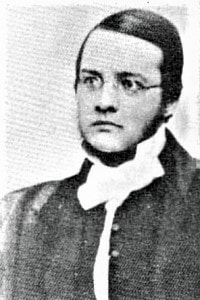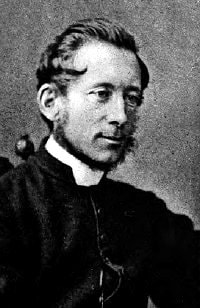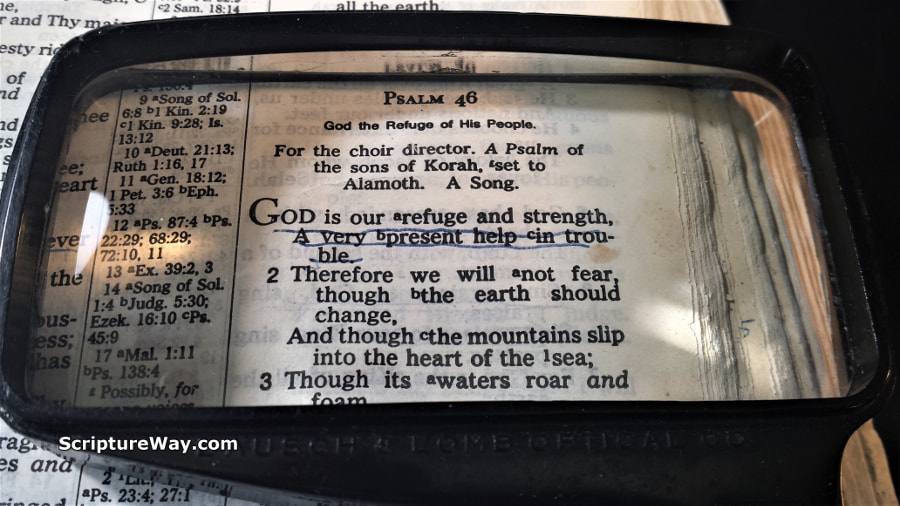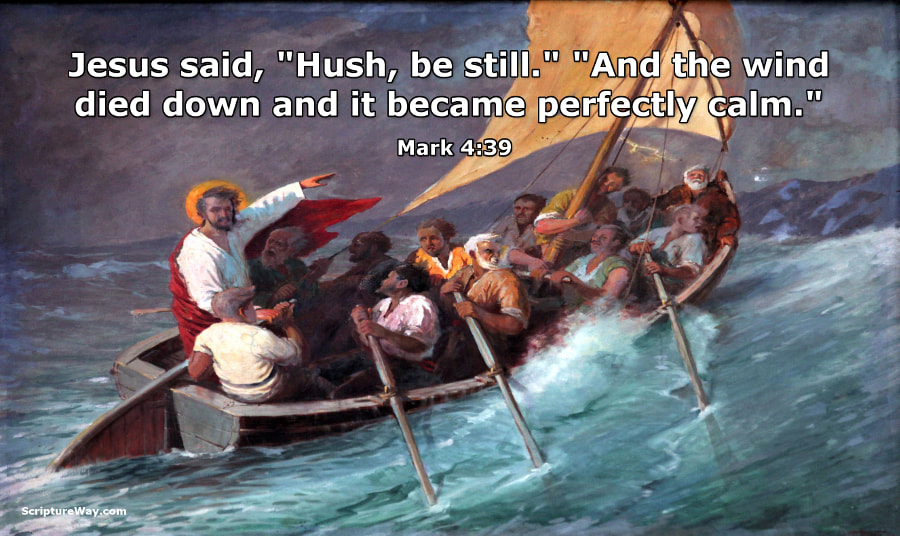Consider. Do you need God's help and strength for what you are facing today? How can you better experience God's protection as your refuge?
God is Our Refuge
The Bible tells us that God is our place of safety and protection from danger and distress. A refuge is a place where we go, and while we are inside, we are protected because our refuge surrounds us as our defense. David writes, "For You have been a refuge for me, A tower of strength against the enemy" (Psalm 61:3). Solomon writes, "The name of the Lord is a strong tower; The righteous runs into it and is safe" (Proverbs 18:10). David tells us from his own experience, "The angel of the Lord encamps around those who fear him, and delivers them" (Psalm 34:7, italics added).
The Bible provides several clear images for God as our refuge - a tower that we run into (Psalm 61:3, Proverbs 18:10), our shelter from the storm (Isaiah 25:4), our rock and fortress (Psalm 18:2), our shield (Psalm 28:7), and our hiding place (Psalm 32:7).
God is Our Strength
Note that Psalm 46:1 does not just say "God is strong" (which he is). This scripture verse says that God is our strength. We who are God's people can receive, experience, and apply God's strength to face our enemies such as worry, fear, discouragement, and opposition. God gives us the strength to accomplish the work he gives us to do in the face of these enemies.
The Apostle Paul knew that God was his strength. Paul wrote during his imprisonment, "I can do all things through Christ who strengthens me" (Philippians 4:13). God provides strength to the believer to accomplish what God gives the believer faith to do (1 John 5:4). As believers, we need God's strength when we encounter resistance and trials. God provides us that strength. Hymn composer Will L. Thompson (1847-1909) writes, "Jesus is all the world to me, My life, my joy, my all; He is my strength from day to day, Without him I would fall" (Ref. 1). David writes, "The Lord is my strength and my shield; in him my heart trusts, and I am helped; my heart exults, and with my song I give thanks to him" (Psalm 28:7). God is a Very Present (Proven) Help in Trouble
The word for help means aid, assistance (Ref. 2, Ref. 3). The word translated as present means proven to be (Ref. 4), that is, God is proven to be our help in trouble. The word very means exceedingly, emphasizing that this statement is true (Ref. 5, Ref. 6). Because God is proven to be our help in trouble, we have nothing to fear (Psalm 46:2).
David writes, "For you have been my help, and in the shadow of your wings I will sing for joy" (Psalm 63:7). The writer of Hebrews states, "The Lord is my helper; I will not fear; what can man do to me?" (Hebrews 13:6).
Summary. Let's review the main principles in this lesson.
1. God is our "go to" place for refuge, safety, and protection from danger. God surrounds us as our defense. 2. God is our source of strength to face our enemies and to do the work he gives us to do. 3. God is proven to be our help in trouble, and we have nothing to fear, repeat, we have nothing to fear.
Apply. Take time now to pray. Thank God for being your refuge - your protection, your place of safety. Ask God to give you strength and faith to face your enemies and to do the work that God has given you to do. Thank God that because of him you have nothing to fear.
Listen to/Watch Video. "A Mighty Fortress" sung by HeartSong - Cedarville University, Cedarville, Ohio, USA.
References
1. https://hymnary.org/text/jesus_is_all_the_world_to_me_my_life_my 2. https://biblehub.com/hebrew/5833.htm 3. https://www.merriam-webster.com/dictionary/help 4. https://biblehub.com/hebrew/4672.htm 5. https://biblehub.com/commentaries/barnes/psalms/46.htm 6. https://biblehub.com/hebrew/3966.htm
4 Comments
"And He got up and rebuked the wind and said to the sea, 'Hush, be still.' And the wind died down and it became perfectly calm." (Mark 4:39) "O Christ! Whose voice the waters heard And hushed their raging at Thy word ..." -- William Whiting (1860, Ref. 1) Background. "Eternal Father, Strong to Save" is a hymn traditionally associated with seafarers, particularly in the maritime armed services (Ref. 2). The hymn became popular with the Royal Navy and the United States Navy in the late 19th century. The hymn also has a long tradition in civilian maritime contexts as well, being regularly sung during services on ocean crossings (Ref. 2). In America, "Eternal Father" is often called the Navy Hymn because it is sung at the U.S. Naval Academy in Annapolis, Maryland. In 1879, Lieutenant Commander Charles Jackson Train was a navigation instructor at the U.S. Naval Academy and the master of the Midshipman Choir. Train began the practice of concluding worship services with the 1861 version of the hymn every Sunday. The hymn eventually became a service-wide tradition, becoming known as the Navy Hymn (Ref. 2). The U.S. Navy Band played “Eternal Father” in 1963 as U.S. President John Kennedy's body was carried up the steps of the U.S. Capitol to lie in state. Kennedy was a PT (Patrol Torpedo) boat commander in World War II (Ref. 2, Ref. 3). “Eternal Father” was played by the Navy Band and the Coast Guard Band during the funeral of U.S. former President Ronald Reagan. The hymn was also played at the Memorial Ceremony in Norfolk, VA for the USS Cole (DDG-67) after the bombing of the ship in October 2000. It was performed by the U.S. Navy Sea Chanters at the State Funeral of U.S. former President Gerald R. Ford, who had served in the U.S. Navy during World War II in the Pacific Theater (Ref. 2). The congregation and choir at Washington National Cathedral sang "Eternal Father" during the funerals for Senator John McCain on September 1, 2018 and for former U.S. President George H. W. Bush on December 5, 2018. Both served as U.S. Navy pilots (Ref. 2).  William Whiting (Ref. 5) William Whiting (Ref. 5) Hymn Text Author. William Whiting (1825-1878) was an Anglican churchman and resided on the English coast near the ocean (Ref. 2, Ref. 4). At the age of thirty-five he felt his life spared by God when a violent storm in the Mediterranean nearly claimed the ship he was traveling on. The storm instilled his belief in God’s command over the rage and calm of the sea (Ref. 2). When Whiting was headmaster at Winchester College Chorister’s School some years later, the memory of his voyage allowed Whiting to provide comfort to one of the boys he taught (Ref. 5). One day, a student confided that he was about to embark on a journey to America – "a voyage fraught with danger at that time" (Ref. 5). "A sympathetic Whiting described his own frightening experience, and he and the other boys prayed for the terrified student. And then Whiting told him, 'Before you depart, I will give you something to anchor your faith' " (Ref. 5). Whiting wrote a poem describing God’s power even over the mighty oceans (Ref. 2, Ref. 5). That poem, written in 1860, became the original text for the hymn, "Eternal Father, Strong to Save."  John Bacchus Dykes (Ref. 6) John Bacchus Dykes (Ref. 6) Hymn Tune Composer. John Bacchus Dykes (1823-1876) was an English clergyman and a prolific hymn tune composer (Ref. 6). Dykes composed the tune for "Eternal Father, Strong to Save" in 1861. Dykes fittingly named the tune "Melita" after a location associated with a Biblical shipwreck. Melita was the island where the Apostle Paul was shipwrecked (Acts 27:41-28:1). Today we know it as the isle of Malta (Ref. 2). Reverend Dykes published sermons and articles on religion but is best known for over 300 hymn tunes he composed (Ref. 7). In addition to his tune, Melita ("Eternal Father, Strong to Save"), John Dykes’ composed well-known tunes including Nicaea ("Holy, Holy, Holy! Lord God Almighty!") and St. Agnes ("Jesus, the Very Thought of Thee," "Happy the Home When God is There"). Scripture References. Ref. 2 and Ref. 8 provide the original verses of "Eternal Father, Strong to Save," 1861 version. You also can follow the verses by downloading the sheet music (link at top of this post, or by clicking here).
Listen - "Eternal Father, Strong to Save." U.S. Naval Academy Men's Glee Club - U.S.S. Arizona Memorial - 19March2007 Dramatic Storm Video - Marine Nationale de France with Praque Philharmonic Orchestra and Chorus - 11June2013 Military Wives - Eternal Father, Strong to Save - 10March2013 Apply. Pray for those who are serving in harm's way and need God's protection. Pray for yourself and others who are going through a storm and ask Jesus to bring calm and peace out of distress and trouble. References
1. https://www.navy.mil/navydata/nav_legacy.asp?id=172 2. https://en.wikipedia.org/wiki/Eternal_Father,_Strong_to_Save 3. https://en.wikipedia.org/wiki/PT_boat 4. https://en.wikipedia.org/wiki/William_Whiting_(poet) 5. Ref. 5 begins on the next line https://theamericanrenewalproject.org/2015/11/the-navy-hymn-eternal-father-strong-to-save/ 6. https://en.wikipedia.org/wiki/John_Bacchus_Dykes 7. http://www.hymntime.com/tch/bio/d/y/k/dykes_jb.htm 8. http://www.hymntime.com/tch/htm/e/t/e/eternalf.htm |
Daily Bible Verse(Click the link above) AuthorMr. Whitney V. Myers. Christian. For more information, please visit the Author Page. Posting ScheduleI plan to provide new postings about once a month. Planned Topics(subject to change) Recent Posts(most recent three months) Popular Posts(top 10) Categories
All
Archives
July 2024
|
|
Copyright 2018-2024 Whitney V. Myers |
Listed in Feedspot's Top 100 Bible Study Blogs and Websites |


 RSS Feed
RSS Feed
